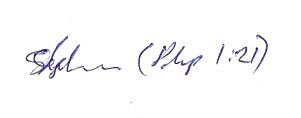I am working on the final draft of the Disciple's Bible (http://www.biblesupp...isciples-bible/)...I'm just curious. Would you rather have "Yahweh" or "The LORD" throughout the Old Testament? Or perhaps a mixture like the Holman Christian Standard Bible does? Any input would be greatly appreciated.

"Yahweh" or "The LORD"?
#2

Posted 09 January 2016 - 06:41 AM
This is your choice; If you always use Yahweh then shall the most Jews reject it because their leaders like more a censured version with HaShem(The Name).
If you not use Yahweh then shall the Sacred Name movement reject it or they reject it because of the spelling.
I tried a mixture based on quotation for both testaments and a JHVH version in both testaments.
How shall you deal with Andonai JHVH?
http://www.biblesupp...eviews/?p=26655
The old Disciple's Bible has a formatting problems with open tags that caused that other Bibles after it also become bold in compare mode.
Please use Tooltip Tool NT and click on modules and Bible "read the Bible" and then "save Bible" for the correct formatting.
Restored Holy Bible 17 and the Restored Textus Receptus
#3

Posted 09 January 2016 - 09:33 AM
Andonai JHVH is usually translated "Lord GOD," and if I use Yahweh it is "Lord Yahweh." I understand that no matter what I do there will be groups who reject it. I could simply transliterate it as YHVH...but that would likely draw objections too.
I'm not sure how to fix the open tags problem...I know just enough to put the modules together the way I have them now. When I put text in bold type it is like this:
John 1:23 He said, I am {\b the voice of one crying in the wilderness, Make straight the way of the Lord,} as said Isaiah the prophet.
I'll try what you suggested with the Tooltip Tool. Thanks.
#4

Posted 09 January 2016 - 11:14 AM
I'm not sure how to fix the open tags problem...I know just enough to put the modules together the way I have them now. When I put text in bold type it is like this:
John 1:23 He said, I am {\b the voice of one crying in the wilderness, Make straight the way of the Lord,} as said Isaiah the prophet.
I'll try what you suggested with the Tooltip Tool. Thanks.
There are 2 problems with this format:
Only use { and } on the Beginning and End of a RTF document: It block other Bible modules if there is only a { in the verse.
There is no \b0 in the verse. (this is the problem for other Bible modules).
Better RTF formatting:
John 1:23 He said, I am \b the voice of one crying in the wilderness, Make straight the way of the Lord,\b0 as said Isaiah the prophet.
With a double space after \b0 except with punctuation ( . ! ? ; : , )
Edited by Katoog, 09 January 2016 - 11:57 AM.
Restored Holy Bible 17 and the Restored Textus Receptus
#5

Posted 09 January 2016 - 11:37 AM
Since no one knows for certain how the Lord's divine name is pronounced (practically no one accepted the pronunciation "Yahweh" until the past 100 years, for example), it might be best to use "the LORD." When I preach, I, personally, go with "Jehovah" as is it the way it appears in most translations.
#6

Posted 09 January 2016 - 07:36 PM
Since no one knows for certain how the Lord's divine name is pronounced (practically no one accepted the pronunciation "Yahweh" until the past 100 years, for example), it might be best to use "the LORD." When I preach, I, personally, go with "Jehovah" as is it the way it appears in most translations.
Hi Brad,
On this, Joseph Viel, in his thesis, "The Complex Name of the Almighty," refutes this belief, and answers this question of, "Why is the Name not said today?" Of which, apparently has little or next to nothing to do with not knowing how the Divine Name is pronounced or to be pronounced. He thoroughly goes through the historicity of how this name has been negated, as seen below:
- After the Babylonian Captivity, Jews decided not to speak the Divine Name in any language but Hebrew. This is evidenced by the fact that the Aramaic parts of Scripture never use the Divine Name.
- Later, it was declared that the Divine Name could not be spoken in a publicly mixed environment, except at the temple. However, there was no ban on speaking the name privately, in prayer, or in selective privileged communications.
- Among the privileged communications were:
- that a Father had a duty to teach his son how to say the Name once every 7 years. Also, rabbis could teach it to their students, or scribes to other scribes. Maimonides said inGuide to the Perplexed (1140 AD) that the pronunciation of the Name should be taught every 7 years by a man to his son, or a rabbi to his student. So we can date the fact that there was a duty to say the name a few centuries after the Masoret period in selective cases.
- Further evidence to this is found in the translation of a commentary on Psalm 20 I will provide in this dissertation. This commentary says that “teachers will say it with their students” and goes on to add that the students would respond using “the vowels of the Name as” he recorded it in the document. The vowels to the Name or other unusual situations (such as feminine vowels with masculine constructions as in this Psalm) are presumed to have been passed down orally before the advent of writing them down.
- During private prayer, one could speak the Name under certain conditions.
- There actually is evidence that at least some Jewish congregations spoke the Divine Name liturgically even into the 17th / 18th centuries. However, this may have been with the same frequency as Maimonides records (perhaps every 7 years as well). Jewish prayer books, holiday liturgical books, etc, are well recorded in which the Divine Name is used, pronounced, both with the traditional Masoretic pronunciations as well as with other pronunciations.
- The not so distant view that the Divine Name is spoken only in Hebrew and only in certain situations and times has somehow evolved into a near complete ban on speaking the Name, only within our more modern age.
So, on that note, I'll leave it there.
Blessings,
Edited by APsit190, 09 January 2016 - 07:44 PM.
#7

Posted 09 January 2016 - 08:39 PM
The thing you quoted agrees with me, in that Jewish sources give multiple pronunciations of the name.
Jewish prayer books, holiday liturgical books, etc, are well recorded in which the Divine Name is used, pronounced, both with the traditional Masoretic pronunciations as well as with other pronunciations.
#8

Posted 10 January 2016 - 02:54 PM
Hi Brad,
Talking about pronunciations of the Divine Name, the basic reason for the different pronunciations, is that each one has its own meaning, and each pronunciation signifies the import to that meaning. Joseph Viel, in that thesis, asserts there are (off the top of my head) I think over 2,000 pronunciations to the Divine Name, and that each one has its own particular meaning. This is something I quite agree with.
One of the things I've noticed when looking at Hebrew Grammar, even the slightest change in the grammar, or vowel point can change the meaning of a name/word, quite significantly, even to the point it can be a complete antonym to an original meaning. This is one of the reasons why I go by the dictum, "it is not a case of one size fits all," when it comes to Hebrew (or Greek, for that matter).
Blessings,
Reply to this topic

0 user(s) are reading this topic
0 members, 0 guests, 0 anonymous users
Similar Topics
Lange, J. P. - The Life of the Lord Jesus Christ (4 Vols)Started by Guest_billhuff2002_* , 02 May 2018 |
Word of Yahweh Version download troubleStarted by Guest_Maisey Humphrey_* , 25 Feb 2013 |
Give Thanks to the lordStarted by Guest_Josh Bond_* , 22 Nov 2012 |
Samuel J Andrews - The Life of Our Lord Upon The EarthStarted by Guest_StandingFirm_* , 22 Mar 2012 |
Frequently Asked Questions
Latest Blogs
- 10 justifications for Bible reading
by SarahSherrill, Jun 27 2022 02:53 AM
According to the experts from Astros DigitalHere are ten reaso... - How can I fix the Cash App if it isn't Working?
by cashcardhelps, Jun 07 2022 01:12 AM
First, you must keep the app up to date with the most recent v... - How can an app benefit your pharmacy in growing business earnings
by Alteza, Jun 06 2022 03:14 AM
Apps comprise a large portion of the tech-driven society that... - What Is a Satire Essay Anyway?
by Caleb9, Jun 04 2022 08:22 AM
What Is a Satire Essay Anyway?A large number of professional w... - 25% OFF on Mauli Thread Rakhi Online for Brother
by giftsvalla, Jun 03 2022 02:02 AM
Mauli Rakhi are generally red. The red colour symbolizes stren...


















